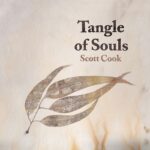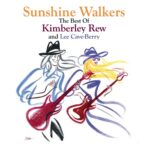 The last album from Scott Cook to hit my inbox was 2016’s “Go Long”, which shone a beam on the more light-hearted side of Scott’s songwriting. He described it as ‘a bunch of silly songs’, which didn’t entirely do it justice, because it had its serious moments and it was actually a great bunch of songs, whatever the flavour. “Tangle of Souls” is a very different proposition; it was written following a brush with the reaper and reflects the re-evaluation following that experience as well as other, happier, life events. Also, Scott Cook’s a philosopher and an idealist; it shouldn’t be surprising that there’s a sprinkling of social comment on the album as well. There are a lot of targets out there in 2020 and Scott firmly sets his sights on quite a few of them.
The last album from Scott Cook to hit my inbox was 2016’s “Go Long”, which shone a beam on the more light-hearted side of Scott’s songwriting. He described it as ‘a bunch of silly songs’, which didn’t entirely do it justice, because it had its serious moments and it was actually a great bunch of songs, whatever the flavour. “Tangle of Souls” is a very different proposition; it was written following a brush with the reaper and reflects the re-evaluation following that experience as well as other, happier, life events. Also, Scott Cook’s a philosopher and an idealist; it shouldn’t be surprising that there’s a sprinkling of social comment on the album as well. There are a lot of targets out there in 2020 and Scott firmly sets his sights on quite a few of them.
Let’s just take a step away from this particular album for the moment to look at albums in general. There’s a school of thought that the album is dead (particularly in CD form) and that a series of singles is the best way to capitalise on your work. Which might work if you rely on streaming or downloads for income; for artists who tour a lot in smaller venues an album or EP to sell at the merch desk is a great way to generate income without the hassle of distribution. What Scott has done with this album (and, to a lesser extent 2017’s “Further Down the Line”) is to go back to an earlier time when the music was only part of the album-buying experience. If you’re of a certain vintage, you’ll remember buying the album and checking out the artwork, credits, sleeve notes and lyric sheets, probably on the bus home. It built up the anticipation before you got the chance to play the album. What Scott’s done with “Tangle of Souls” takes this a few stages further. The album includes a two hundred and forty-page booklet which includes credits, lyrics, chords for the songs, the inspiration behind, and explanation of the songs and some of Scott’s biographical, historical and philosophical writings. It’s even printed on specialist paper with hand-drawn artwork. That’s got to be better than a thumbnail of the artist as you listen to a stream or a download (and yes, I did read all of it, it would have been rude not to).
So to the songs. There are twelve of them and each one of them is memorable, and several of them, for me, are classics. “Just Enough Empties” contrasts a gentler, not-too-distant past, with a lonely and alienated present through one person’s journey down a road of innocence, awakening, degradation and redemption linked by the practical idea of glass bottle recycling; it’s a beautifully-crafted song. “Say Can You See”, with the obvious reference to the “Star-Spangled Banner” in the title, is built around a string band arrangement and is Scott’s most overtly political song so far. It’s political, but in a non-partisan way; the message is that virtually everyone on the Hill (Republican or Democrat) is the enemy of the working people and that draining the swamp should actually flush away all of them (‘It ain’t about right and left, it’s about right and wrong’). Those two songs alone would make this a five-star album for me, but there’s even more.
“Passin’ Through” was written by Dick Blakeslee in the forties and it’s one of those songs that lends itself to verses being changed or added. The narrative structure could have inspired the Stones’ “Sympathy for the Devil”; Jagger says it was something from Rabelais, but he would say that, wouldn’t he? Scott adds his own verse to the song with a tribute to Victor Jara, the Chilean activist beaten and executed by Pinochet’s thugs in the Santiago Estadio Nacional in 1973. This song attracted my attention even more because, coincidentally, the Manic Street Preachers’ James Dean Bradfield has recently released an entire album dedicated to Victor Jara (“Even in Exile”). It’s worth checking that out as well.
The last of my personal picks is “What to Keep”, a slow piece that interweaves the personal and political in an exploration of the physical and mental baggage that we carry with us as individuals or as nations. The message is that there are always things that weigh us down that we should cut loose to lighten our load, whether it’s personal memorabilia or inappropriate public commemorations of bygone eras; the less you carry, the easier it is to move forward. The remaining seven songs and one instrumental are all superbly crafted and delivered, and packed with interesting and thought-provoking ideas, but I’d like you to listen to some of the album without the dubious benefit of my opinion.
“Tangle of Souls” is an important work from the wider Americana scene this year. It’s a deeply-considered view of individuals and society twenty years into the twenty-first century; the narratives aren’t necessarily cheerful, but the overall message is positive, in line with Scott’s personal outlook after some challenging times (which you can read about in the book).
“Tangle of Souls” is released in the UK on Friday October 9th.
 Mean Mary (Mary James) is a renowned multi-instrumentalist and banjo virtuoso, but that only scratches the surface of her talent. She’s also an accomplished songwriter, working on her own and with her mother Jean James (who co-wrote half of the songs on the album). “Alone” is Mean Mary (spoiler alert, I‘ve met her and she’s not really mean at all) actually alone with her banjo, guitar and banjitar, which is exactly what you think it is. The title works on several different levels; it’s a solo performance, but it’s also about the loneliness everyone has been experiencing in recent months and the loneliness of the hard life of a touring musician. Before you get the impression “Alone” is a gloomfest, it has its lighter moments, musically and lyrically.
Mean Mary (Mary James) is a renowned multi-instrumentalist and banjo virtuoso, but that only scratches the surface of her talent. She’s also an accomplished songwriter, working on her own and with her mother Jean James (who co-wrote half of the songs on the album). “Alone” is Mean Mary (spoiler alert, I‘ve met her and she’s not really mean at all) actually alone with her banjo, guitar and banjitar, which is exactly what you think it is. The title works on several different levels; it’s a solo performance, but it’s also about the loneliness everyone has been experiencing in recent months and the loneliness of the hard life of a touring musician. Before you get the impression “Alone” is a gloomfest, it has its lighter moments, musically and lyrically.
Mary’s sense of fun shines through in a couple of adaptations of traditional tunes. The blues “Nine Pound Hammer” is updated to “Nine Pound Banjo” while “Little Cindy” gives Cindy a bit of a flirtatious edge as the banjo playing edges into jazz territory. The call and response of the gospel-flavoured “What About Today?” is subverted by a calypso-inflected banjo part that again adds a sense of fun to the song.
Of the more serious songs, “Big Tour Bus” is a look into the totally unglamorous world of a solo touring artist on the road; it’s a bleak and harrowing story that raises the question of why anyone would show such dedication. It’s powerful stuff. The last two songs on the album move away from the humour, nostalgia and road-weariness that dominate the album. “Breathless” is Mary’s take on the Bonnie and Clyde narrative, with the two messages that the wrong turning is all too easy to take and that the end isn’t glamorous at all. “We Never Hear the Song” is a banjo-accompanied anthem to the environment, hinting at the greater purpose behind all of it; the musical arrangement whose complexity we can never comprehend.
The variety of styles across the album’s songs is breath-taking as Mary demonstrates her songwriting versatility and virtuoso picking. There’s gritty realism, unsentimental nostalgia, compelling storytelling and humour in abundance. It’s hard to believe at end of ten songs that the only ingredients are one voice and a couple of instruments.
“Alone” is out now on Woodrock Records.
 I have a huge admiration for great songwriters; crafting songs that perfectly convey little slices of life or eternal truths without knowing whether the song will reach half a dozen or millions of people or whether it will hibernate for years and emerge as a shiny (and profitable) hit. Nick Lowe was virtually potless after having a string of hits in the late seventies/early eighties when “(What’s So Funny ‘Bout) Peace, Love and Understanding?” appeared on the soundtrack of “The Bodyguard” as a Curtis Stigers cover in 1992. Kimberley Rew’s career took a slightly different trajectory; as a member of Katrina and the Waves, after several years grinding around Air Force bases and Canadian Clubs, he wrote the massive hit “Walking on Sunshine” and Eurovision winner “Love Shine a Light”, and The Bangles had a minor hit with a cover of his song “Going Down to Liverpool”.
I have a huge admiration for great songwriters; crafting songs that perfectly convey little slices of life or eternal truths without knowing whether the song will reach half a dozen or millions of people or whether it will hibernate for years and emerge as a shiny (and profitable) hit. Nick Lowe was virtually potless after having a string of hits in the late seventies/early eighties when “(What’s So Funny ‘Bout) Peace, Love and Understanding?” appeared on the soundtrack of “The Bodyguard” as a Curtis Stigers cover in 1992. Kimberley Rew’s career took a slightly different trajectory; as a member of Katrina and the Waves, after several years grinding around Air Force bases and Canadian Clubs, he wrote the massive hit “Walking on Sunshine” and Eurovision winner “Love Shine a Light”, and The Bangles had a minor hit with a cover of his song “Going Down to Liverpool”.
After Katrina’s departure in 1999, Kimberley carried on writing and recording with his partner and bass player Lee Cave-Berry. The songs were still superb, but weren’t troubling the charts; this is the period covered by the twenty-one (count them, twenty-one) songs on “Sunshine Walkers”.
Kimberley Rew is a very English lyricist, in the same vein as Ray Davies, Nick Lowe, Chris Difford and Billy Bragg; the songs couldn’t come from another country; there’s a self-deprecation and irony that you don’t find anywhere else. The other thing he has in common with these writers is that they can all conjure great songs out of the most prosaic situations: Chris Difford wrote the lyrics for the Squeeze classic, “Tempted”, on a journey to Heathrow.
And so it goes, on the album’s first song, “The Dog Song”, inspired by seeing dogs on an obstacle course for TV entertainment, is a romp through Chuck Berry territory with humorous lyrics, clever rhymes and perfect harmonies. It gets the album off to a flying start and sets the tone for a bunch of songs covering various musical styles and even a couple of those songwriters’ favourites for occasions that recur annually, “All I Want is You for Christmas” and “Happy Anniversary”.
Of the remaining dozen and a half songs, there’s absolutely no filler and several that push all of my buttons, mainly the quintessentially English ones. “Bloody Old England” is Billy Bragg meets Victor Meldrew homesickness for this grey old country set to a skiffle beat, while the national pride and clever rhymes of “English Road” wouldn’t have sounded out of place on an eighties Rockpile album. And let’s not forget “Backing Singer Blues”; I’m not a great fan of the humorous song, but this one actually works. It slightly exaggerates a situation everyone in the business can identify with, and it’s catchy as all hell.
It’s not often that an album can grab my butterfly attention span for twenty-one songs, but “Sunshine Walkers” did it; Kimberley Rew is one of our national treasures whose talents deserve much more exposure.
“Sunshine Walkers” is out now on KL Recording (KL013).


